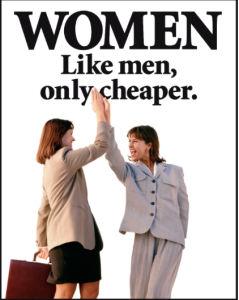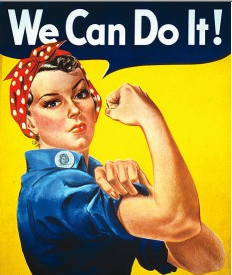
“When a man gives his opinion, he’s a man. When a woman gives her opinion, she’s a bitch.” ― Bette Davis
Three women – an Arab woman (myself), a Portuguese engineer and an Irish banker – sat together in a room and chatted about women in the workplace, a topic that’s been on my mind for a while.
Here are a few snipets from the conversations:
“Women have to always prove themselves, but men? Men have hidden potential.”
“Men would be grabbing beers while the rest of us worked around the clock.”
“My ex boss surrounded himself with women because he knew they worked really hard.”
“Women are classified in two categories: either the boys’ ‘homegirl’ or a sexual object.”
Women. At work. In society. We are all in the same boat.
Modern Western societies create a sort of “propaganda” surrounding the topic of women’s rights, presenting the image that there exists equality between men and women. Companies create programs to protect and promote women at work and put them in places of power.
But is all of this real or is it just a projected image? Are we Arabs and third world countries simply behind on everything?

Even with all of these women’s empowerment programs adopted by corporations, policies that are intended to promote equality still end up backfiring for women. Questions and judgments arouse when women enter the workplace, such as “Are you promoting her based on merit?” and “Oh she just got the job because she is a woman.” Although we could have endless debates on how to assess one’s performance at work, the truth is that women always, continuously and forever must prove themselves to be deemed “deserving” of her position.
Have you watched Mad Men? Have you noticed how women only made it as secretaries back in the day?
On the other hand, most of us women have grown accustomed to the blame game. If something bad happens at work, we probably brought it on ourselves, asked for it or even deserved it. If you are sexually harassed by male colleagues, it’s something you wore. If you don’t get a promotion even though you worked hard, it’s probably because you’re just not working hard enough. If you’re single, you’re to blame too. And the vicious circle becomes endless.
On the other hand, women are deeply affected on a personal level when it comes to maintaining a career. Their personal life always seem to be in danger or on the brink of collapsing. Women are not only expected to always support the family, but they also feel guilty one way or the other when choosing between an hour extra at work or taking care of a child at home.
After all, when is a man expected to stay home if his kids are sick?
“It is clear that the world of business is being transformed by women, but the gender makeup of business leadership has barely changed.” – Forbes
Today, Switzerland is held in high regard for its quality of life and democracy. Ironically, it was among the last countries in Europe to give women the right to vote, finally extending the right in February 7, 1971. What does that tell you?
I spoke to a female executive director, a woman with years of experience in the oil and gas industry, to get a view on where she stands with regards to the subject. She’s a tough cookie and never experienced any discrimination herself. However, taking a step back, she said it was indeed noticeable that men occupied most of the senior roles in the industry. Somehow, men seemed to be taken more seriously and were given easier access.
Portugal now has one of the highest percentages of working women in Europe. Yet, culturally speaking, the population’s view of women in society or in the workplace doesn’t seem to have altered… one bit.
Interesting facts about Portugal:
- 29% of men have successfully completed high school compared with 35% of women
- 68% of men are employed compared with 60% of women
- According to the OECD’s Program for International Student Assessment (PISA), on average in Portugal, girls outperformed boys by 10 points
- The employment rate for women seems to have decreased after the global financial crisis of 2008, dropping to the 58.7 percentile from 62.5
I feel that we are somehow held in high regards though, since a simple conversation about equality a few women had over dinner can become society’s next controversial piece.
And what are we doing about all this?

Nothing. For starters, we can start working together. As women, we can get really, really competitive with each other. We fight each other to death in an office instead of playing ball as a team (and that’s because there is no room for women in the first place). Receiving feedback from a female supervisor or colleague can turn into really nasty comments like “Is she jealous?” or “What is she really trying to say?”
Trying to be a man won’t help. And to my Egyptian friends, putting yourself down and confining yourself to the role of a housewife will definitely NOT help.
Appreciate yourself as your female attributes – for example, a woman’s intuition is a quality no man or robot can replicate, not with all the “analytical” data in the world. So use it. And be proud of it.
Ultimately, my point is that Arab women are not alone in their struggle for equality in the workplace. All around the world you see the same form of discrimination against women of every nationality and color – from Saudi Arabia’s treatment of women to Europeans toasting beers to their colleagues “boobs”.
“I myself have never been able to find out precisely what feminism is: I only know that people call me a feminist whenever I express sentiments that differentiate me from a doormat.” ― Rebecca West
WE SAID THIS: Inspire yourself with these 10 Wise Pieces of Advice from Successful Women in the Region.


